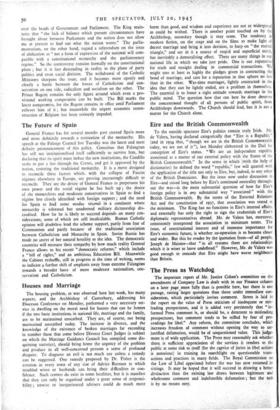Eire and the British Commonwealth
To the outside spectator Eire's politics remain truly Irish. Mr. de Valera, having declared categorically that "Eire is a Republic" (and in 1934 that, " though we are in the British Commonwealth today, we are not of it"), last Monday elaborated in the Dail his conception of Eire's status. " We are an independent republic associated as a matter of our external policy with the States of the British Commonwealth." In the sense in which (with the help of dictionaries) he defined the word "republic," few will quarrel with the application of the title not only to Eire, but, indeed, to any other of the British Dominions. But the issue now under discussion in Eire—and raised long before by Eire's continued neutrality through- out the war—is the more substantial question of how far Eire's foreign policy is in any substantial way " associated" with the British Commonwealth. By the terms of the External Relations Act and the constitution of 1937, that association was stated at the minimum. The King has no functions in Eire's internal affairs, and externally has only the right to sign the credentials of Eire's diplomatic representatives abroad. Mr. de Valera has, moreover, consistently interpreted the association in minimum terms. The issue, of constitutional interest and of immense importance for Eire's economic future, is whether co-operation is to become closer and wider. But this he evades by the iluotation from—of all people, Joseph de Maistre—that "in all systems there are relationships which it is wiser to leave undefined." However, Mr. de Valera was good enough to concede that Eire might have worse neighbours than Britain.


























 Previous page
Previous page